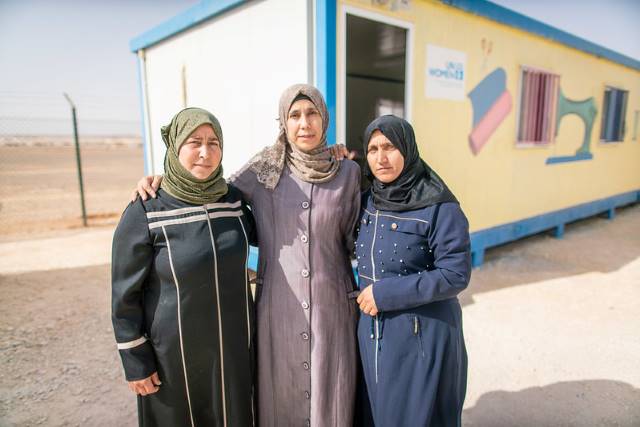Women in Conflict Resolution in MENA
 The year 2020 has taught the world a series of valuable lessons. Still, one that strikes most potent is the importance of women’s presence in critical fields, such as conflict resolution. For years this issue has received a poor reputation for ineffectiveness and persistent recidivism, specifically due to continued violence. However, the recent inclusion of women in conflict resolution changes this, transforming the field as the world knows it. Since 2016, women’s inclusion in conflict resolution has shown a 64% less chance of failed peace negotiations and a 35% increase in the likelihood of long-term peace. While women are beginning to shine on the world stage, there are still conflict-ridden regions where they are kept away from the negotiating table. One of these regions is the Middle East and North Africa (MENA).
The year 2020 has taught the world a series of valuable lessons. Still, one that strikes most potent is the importance of women’s presence in critical fields, such as conflict resolution. For years this issue has received a poor reputation for ineffectiveness and persistent recidivism, specifically due to continued violence. However, the recent inclusion of women in conflict resolution changes this, transforming the field as the world knows it. Since 2016, women’s inclusion in conflict resolution has shown a 64% less chance of failed peace negotiations and a 35% increase in the likelihood of long-term peace. While women are beginning to shine on the world stage, there are still conflict-ridden regions where they are kept away from the negotiating table. One of these regions is the Middle East and North Africa (MENA).
Conflict in MENA
In addition to the United States’ recent departure under the Trump administration, the MENA has been riddled with conflict. There are longstanding ideological tensions between Saudi Arabia and Iran. Furthermore, one should note the bloody civil war in Yemen and the Assad-Putin takeover of Syria. Libya is becoming a failing state and more terrorist organizations are rising to power.
This is an integral time for women’s inclusion in conflict resolution as longstanding conflicts will require new models of engagement and unique perspectives. If women are to achieve an equal socioeconomic standing to men in the MENA, now is the time for action.
Overview of Progress
Since the early 2000s, women have been playing an active role in conflict resolution. A prominent example is the Women of Liberia Mass Action for Peace Movement. In both the first and second Liberian Civil Wars, the movement’s women hosted communal activities, such as prayer gatherings, to unite the warring Christian and Muslim populations. Eventually, the group gained so much momentum that members advanced the organization to more direct advocacy and activism. This was during a time of rampant sexual violence and the murders of child soldiers. In 2005, the women helped ensure one of the nation’s first free and fair elections, which resulted in the first female African president.
Another way in which women fight for change in the MENA is through women-led nonprofits. Take, for instance, the Center for Egyptian Women’s Legal Assitance (CEWLA). Under the strict rule of current leader Abdel Al-Sissi, Egypt has faced a series of religious violence, economic corruption and denial of fundamental human rights. Nevertheless, since 2013, CEWLA has worked with local grassroots organizations in Egypt to promote female rights. It has fought several legal battles to improve ongoing “legal, social, economic and cultural rights.”
In addition to inter-regional violence, mass immigration and displacement in MENA have resulted in severe economic losses. In response to such conflict, female entrepreneurs in Jordan, Lebanon, Egypt and Palestine banded together to form Ruwwad. Ruwwad is a community engagement organization that focuses on providing women with education, income generation methods and social justice.
Nonetheless, even when it comes to complex matters such as intra-state conflict, women have shown up to unite deeply divided communities often struggling with severe poverty. The Wajir Association for Women’s Peace embodies the said fight for justice. The Association is a group of local women in Wajir, Kenya. The women lead conflict resolution initiatives between the clans’ elders and the at-risk youth. The power stemming from Wajir’s women has even reached the desks of local parliamentary offices. Nationwide reforms have begun to take aim at resolving much of the turmoil occurring in this region as a result of these efforts.
A Plan for the Future
While women’s leadership in the MENA is far from perfect, the region notes massive improvements over the years. This provides ample opportunity to transform the region further. Analysts find that women need political and economic backing from international organizations in order to help promote their localized mediation initiatives and garner stronger support for future peacebuilding. Bills such as the Girls Lead Act, currently in negotiation in Congress, is a step in the right direction and will help develop future female leaders in at-risk developing countries. The MENA region has seen conflict and ethnic violence for decades, but when the world empowers women, the world encourages change.
– Juliette Reyes
Photo: Flickr
